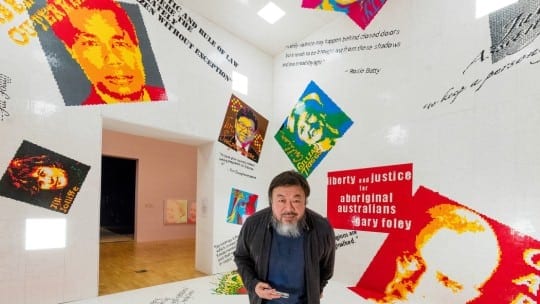
In an April 27 interview with the Wall Street Journal, the Lego Group essentially blamed low-level employees for a crisis involving an artist's request for a bulk order of its plastic blocks.
The Lego Group first denied artist Ai Weiwei’s request to purchase Legos in bulk for use in an art project, then succumbed to the resulting public backlash by reversing the company’s stance on reviewing the “thematic purpose” of the use of its products.
Kjeld Kirk Kristiansen, vice chairman of the Lego Group, told the Journal’s Simon Clark that Ai’s request was denied “very low in the organization by our consumer service department.”
Kristiansen went on to say that the denial was a mistake caused by an employee’s misinterpretation of the company’s policy on political neutrality, according to the Journal.
In October 2015, Lego denied the approval of the Chinese artist and activist’s attempt to make a bulk purchase of the company’s famous plastic bricks for a work to be displayed at the National Gallery of Victoria in Melbourne, Australia, according to Time. After Ai posted about his plight on Instagram, his social media supporters began donating used bricks to the artist, while at the same time condemning the actions of the company, Time reported.
At the time, Tory Taylor, head of Australian marketing for Lego, told ABC, “We refrain, on a global level, from actively engaging in or endorsing the use of Lego bricks in projects or contexts of a political agenda. This principle is not new from the Lego Group.”
In January 2016, months after the story went viral, The Lego Group announced that it would no longer ask buyers about the “thematic purpose” of a project when receiving large orders, Vice reported. Instead, “customers will be asked to make it clear—if they intend to display their LEGO creations in public—that the Lego Group does not support or endorse the specific projects,” reads the company’s January statement.
Even if all this was because of a misunderstanding by a customer service worker, is it good PR to blame a low-level employee in a major media outlet like the Wall Street Journal? After all, there’s no denying the crisis happened, was resolved and now the company seems to be moving forward. Having executives publicly address this issue months after the dust settled seems to be more an act of digging skeletons out of the closet than putting its best foot forward.
The passing of the buck in this way seems especially strange in light of the April 26 announcement by Chobani Founder and CEO Hamdi Ulukaya to give 10% of the company’s worth in stock to its full-time employees. It’s hard to imagine Ulukaya singling out low-level employees in the wake of a crisis.
Situations like this are unavoidable in large corporations. But when they come up, it’s PR’s job to make sure it gets out in front of the crisis quickly by acknowledging it, making changes if needed, and laying the groundwork for how the company will move forward.
Follow Mark: @MarkRenfree
